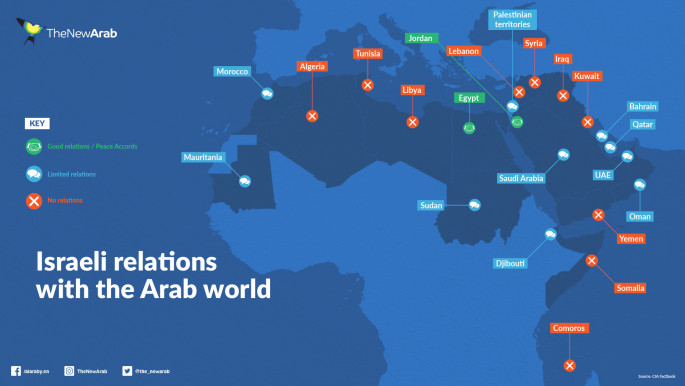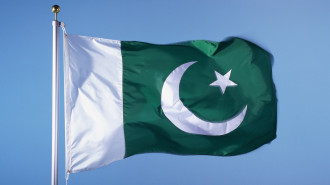It’s still on: Netanyahu contradicts UAE claims it stopped West Bank annexation with ‘peace deal’
It’s still on: Netanyahu contradicts UAE claims it stopped West Bank annexation with ‘peace deal’
Netanyahu stated Israel's planned annexation of large parts of the West Bank is still on the table despite statements by the US and UAE to the contrary.
4 min read
Egypt and Bahrain have welcome the deal [Getty]
Israel's planned annexation of large parts of the occupied West Bank as only been "delayed" and not cancelled following a peace agreement between Israel and the UAE, Prime Minister Benjamin Netanyahu said on Thursday.
Emirati Crown Prince Mohammed bin Zayed had earlier stated the Gulf nation had reached an agreement with Israel "to stop further Israeli annexation of Palestinian territories" as part of a deal to normalise relations.
In a seperate statement, UAE Foreign Minister Anwar Gargash said the agreement had dealt a "death blow" to annexation.
Emirati Crown Prince Mohammed bin Zayed had earlier stated the Gulf nation had reached an agreement with Israel "to stop further Israeli annexation of Palestinian territories" as part of a deal to normalise relations.
In a seperate statement, UAE Foreign Minister Anwar Gargash said the agreement had dealt a "death blow" to annexation.
The US-brokered pact - only the third such agreement of its kind between Israel and an Arab state - was announced earlier on Thursday in a statement shared by President Donald Trump on Twitter.
"At the request of President Trump with the support of the United Arab Emirates, Israel will suspend declaring sovereignty over areas outlined in" the Trump peace plan unveiled earlier this year, the statement said, referring to plans to annex most Israeli settlements and other Palestinian territories in the occupied West Bank.
Despite bin Zayed's statement, Israel's annexation plans remain "on the table", Netanyahu told reporters at a press conference later on Thursday.
Critics and opponents of the Israeli government say rhetoric around "halting" or "suspending" annexation belies the reality on the ground.
Political analyst Omar Baddar echoed that sentiment: "Israel didn't 'halt' the annexation for the West Bank (annexation is ALREADY a de facto reality on the ground)."
"Israel merely 'suspended' its announcement of a reality it has already illegally imposed on Palestinians," Baddar tweeted.
Palestinian militant group Hamas slammed the deal as a "reward for the Israeli occupation's crimes".
"The normalisation is a stabbing in the back of our people," Hamas spokesman Fawzi Barhoum said.
No surprise
For many, the agreement hailed as an "historic breakthrough" by Trump did not come as a shock.
Despite bin Zayed's statement, Israel's annexation plans remain "on the table", Netanyahu told reporters at a press conference later on Thursday.
Annexation "will be done only alongside the United States," the Israeli premier said. "Without coordination, in the best case, will do nothing, and in the worst case, will harm relations between us."
"The United States asked that Israel temporarily postpone annexation," Netanyahu explained.
Israel remains "committed" to realising the controversial annexation plans, he added.
Read more: UAE feigns opposition to Israeli annexation to push normalisation
It is the first such peace deal to be reached with an Arab state that did not involve land swaps or agreements to withdraw Israeli troops or settlers from Palestinian territory, Netanyahu said.
The Israeli premier's decision to delay the annexation process will be unpopular among much of his key base in the religious right.
"The faith in you has expired," settler leader David Alhayani said in response to the agreement. Opposition MK Bezalel Smotrich said the deal proved Netanyahu was not a true "nationalist".
Prominent pro-settlemenet politician Naftali Bennett welcomed the deal but said Netanyahu had missed out on an "historic opportunity".
Oded Revivi, a top figure in the Yesha settler council and a major advocate of annexation, said the move was a "fair price" to pay for the peace agreement though.
Facts on the groundRead more: UAE feigns opposition to Israeli annexation to push normalisation
It is the first such peace deal to be reached with an Arab state that did not involve land swaps or agreements to withdraw Israeli troops or settlers from Palestinian territory, Netanyahu said.
The Israeli premier's decision to delay the annexation process will be unpopular among much of his key base in the religious right.
"The faith in you has expired," settler leader David Alhayani said in response to the agreement. Opposition MK Bezalel Smotrich said the deal proved Netanyahu was not a true "nationalist".
Prominent pro-settlemenet politician Naftali Bennett welcomed the deal but said Netanyahu had missed out on an "historic opportunity".
Oded Revivi, a top figure in the Yesha settler council and a major advocate of annexation, said the move was a "fair price" to pay for the peace agreement though.
Critics and opponents of the Israeli government say rhetoric around "halting" or "suspending" annexation belies the reality on the ground.
|
|
"Israel got rewarded for not declaring openly what it's been doing to Palestine illegally & persistently since the beginning of the occupation," prominent Palestinian politician Hanan Ashrawi said in a tweet.
"Israel merely 'suspended' its announcement of a reality it has already illegally imposed on Palestinians," Baddar tweeted.
Palestinian militant group Hamas slammed the deal as a "reward for the Israeli occupation's crimes".
"The normalisation is a stabbing in the back of our people," Hamas spokesman Fawzi Barhoum said.
No surprise
For many, the agreement hailed as an "historic breakthrough" by Trump did not come as a shock.
 |
| [Click to enlarge] |
The normalisation of ties between Israel and the powerful Gulf state had been expected for some time.
Tel Aviv has also pursued diplomatic ties with Oman, Bahrain and Sudan, as well as reportedly making in roads towards normalisation with Saudi Arabia in recent years.
Both President Trump and Prime Minister Netanyahu acknowledged as much in their statements on Thursday, saying they hoped the deal would pave the way for further agreements with Arab states.
"The UAE (Bahrain and Oman to follow) have long coveted a formal ties with Israel. Framing it as an exchange for an Israeli postponement of its annexation of the occupied West Bank is fools no one," journalist Ali Younes said in a tweet.
Both Bahrain and Egypt - which was the first Arab state to sign a peace agreement with Israel - have welcome the deal.
Agencies contributed to this report
Follow us on Facebook, Twitter and Instagram to stay connected
Tel Aviv has also pursued diplomatic ties with Oman, Bahrain and Sudan, as well as reportedly making in roads towards normalisation with Saudi Arabia in recent years.
Both President Trump and Prime Minister Netanyahu acknowledged as much in their statements on Thursday, saying they hoped the deal would pave the way for further agreements with Arab states.
"The UAE (Bahrain and Oman to follow) have long coveted a formal ties with Israel. Framing it as an exchange for an Israeli postponement of its annexation of the occupied West Bank is fools no one," journalist Ali Younes said in a tweet.
Both Bahrain and Egypt - which was the first Arab state to sign a peace agreement with Israel - have welcome the deal.
Agencies contributed to this report
Follow us on Facebook, Twitter and Instagram to stay connected







 Follow the Middle East's top stories in English at The New Arab on Google News
Follow the Middle East's top stories in English at The New Arab on Google News
![A woman walks in front of a shop selling traditional items in the Old City of Tripoli on September 11, 2024. [Getty]](/sites/default/files/styles/image_330x185/public/2170635815.jpeg?h=37b4805e&itok=c11tWdx-)
![On 20 October 2023, nationwide protests broke out in support Gaza, commencing from Cairo's iconic Tahrir Square, which witnessed the advent of the 25 January Revolution. [Getty]](/sites/default/files/styles/image_330x185/public/1734956488.jpeg?h=a5f2f23a&itok=EoEuKPcP)
